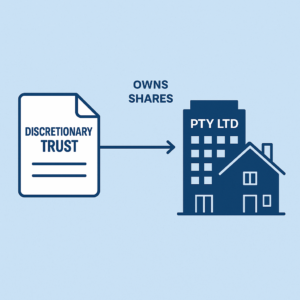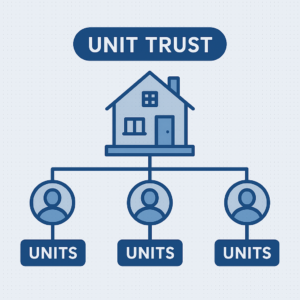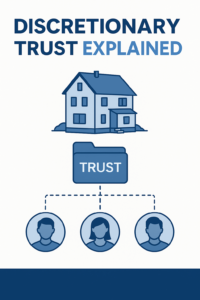When to Use a Discretionary Trust to Operate a Business: Benefits, Trade-Offs, and Comparisons
When starting or restructuring a business, one of the most important decisions is choosing the right business structure. For many small-to-medium enterprises (SMEs), professionals, and family-run businesses, a discretionary trust (often called a family trust) can offer significant advantages — particularly around tax flexibility, asset protection, and long-term wealth management.
However, trusts are not the right fit for every business. In this article, we’ll explore when it may be appropriate to use a discretionary trust to operate a business, its key benefits and limitations, and how it compares to using a company structure with an individual shareholder.

What is a Discretionary Trust?
A discretionary trust is a legal arrangement where a trustee holds and manages assets for the benefit of a group of beneficiaries. The trustee has discretion (hence the name) over how income and capital are distributed among beneficiaries each year.
Typically, the trustee can be a company (corporate trustee) or an individual, and the beneficiaries often include family members, related entities, or even other trusts. Beneficiaries are usually listed in broad classes under the trust deed, allowing flexibility as to who can receive distributions each year, subject to the trustee’s discretion and legal obligations.
When is a Discretionary Trust Appropriate for a Business?
A discretionary trust can be particularly attractive in the following situations:
- The business will be owned and operated by family members or related parties.
- Asset protection and estate planning are priorities.
- There is a desire for flexibility in income distribution for tax efficiency.
- The business is expected to generate capital gains (e.g. sale of goodwill, business assets, or real property).
- The business does not require raising capital through new equity investors.
Key Benefits of Using a Discretionary Trust
1. Asset Protection
Assets held within a discretionary trust are generally protected from claims by creditors of individual beneficiaries. Since beneficiaries don’t have fixed entitlements to the trust’s assets, it is more difficult for personal creditors to access these assets in the event of bankruptcy, litigation, or family law proceedings.
For business owners, this can help shield valuable business assets (such as intellectual property, plant & equipment, or real estate) from personal financial risks.
2. Flexibility in Distributing Profits (Tax Management)
One of the main attractions of discretionary trusts is the flexibility to allocate income among beneficiaries in a tax-effective manner each financial year. This allows the trustee to:
Allocate income to lower-taxed family members.
Distribute to entities with carried forward tax losses.
Manage personal tax thresholds and marginal tax rates across the family group.
Such flexibility is not available to companies with fixed shareholders, where dividends must be paid based on shareholding percentages.
3. Access to the Capital Gains Tax (CGT) Discount
When selling business assets (including goodwill, business property or shares in certain cases), discretionary trusts may access the 50% CGT discount if the asset has been held for more than 12 months.
For example, suppose a family trust sells a business for a $1 million capital gain. The CGT discount reduces the taxable capital gain by 50%, meaning only $500,000 is included in the trust’s assessable income. This income can then be distributed among beneficiaries, potentially minimising the overall tax payable.
In contrast, a company does not receive the 50% CGT discount on capital gains made at the company level.
Limitations of Discretionary Trusts
While discretionary trusts offer attractive benefits, they do have some important limitations:
- Cannot Retain Profits
Unlike companies, trusts must generally distribute their taxable income (as defined by the trust deed and relevant tax law) to beneficiaries by the end of each financial year. Any undistributed income is taxed to the trustee at the highest marginal tax rate (currently 47% including Medicare levy for Australian resident trusts). - Mitigation — Corporate Beneficiary
To manage this issue, a corporate beneficiary can be introduced. Income distributed to a corporate beneficiary is taxed at the corporate tax rate (generally 25% for base rate entities or 30% otherwise), allowing a degree of income deferral while still complying with distribution requirements. However, further tax may apply when extracting funds from the corporate beneficiary to individuals in future years. - Cannot Issue New Equity
Trusts cannot issue shares or new equity interests. This makes raising capital from outside investors more difficult compared to companies. - Complexity and Compliance
Discretionary trusts require careful legal documentation, trust deed management, and specialist tax advice to ensure full compliance with trust law and tax law. Ongoing professional advice is strongly recommended.
Comparing with a Company Structure (with an Individual Shareholder)
Comparing with a Company Structure (with an Individual Shareholder)
| Feature | Discretionary Trust | Company with Individual Shareholder |
|---|---|---|
| Asset Protection | Generally strong for personal assets | Company assets are separate but shareholder assets may be exposed |
| Profit Distribution Flexibility | High — trustee decides annually | None — dividends paid according to shareholding |
| Tax Management | Flexible — income distributed to lower-taxed beneficiaries | Income taxed at corporate rate; dividends franked and taxed on shareholder’s marginal rate |
| CGT Discount | 50% discount available after 12 months (subject to conditions) | No CGT discount on company-level capital gains |
| Retain Earnings | Cannot retain earnings (without corporate beneficiary) | Can retain earnings indefinitely |
| Raising Capital | Cannot issue equity | Can issue new shares to raise capital |
| Simplicity | More complex | Generally simpler for ongoing operations |
Example Scenario
Let’s consider two siblings, Sarah and James, who want to operate a consulting business together:
Option 1 — Discretionary Trust
They establish a discretionary trust with a corporate trustee.
The trust earns $300,000 profit in year one.
The trustee distributes $150,000 to Sarah and $150,000 to James, taking advantage of their personal marginal tax rates.
In year five, they sell the business for a $500,000 capital gain.
The CGT discount reduces the taxable capital gain to $250,000.
The $250,000 is then distributed between Sarah and James, allowing for further tax planning at the personal level.
Option 2 — Company with Individual Shareholders
Sarah and James each own 50% of the company.
The company earns $300,000 and pays 25% corporate tax ($75,000), retaining $225,000 after tax.
Dividends paid to shareholders are franked and subject to top-up tax at the shareholders’ marginal rates.
On sale of the business, the $500,000 capital gain is fully taxable at the corporate tax rate (CGT discount not available at company level).
Conclusion
A discretionary trust can be a highly effective structure for certain businesses, particularly family-run operations, professional service businesses, and asset-holding entities where profit distribution flexibility, asset protection, and access to the CGT discount are valuable.
However, it is important to carefully consider the limitations around retaining earnings, raising capital, and the additional compliance obligations. In many cases, combining a discretionary trust with a corporate beneficiary may provide a strong balance between flexibility and longer-term tax management.
Ultimately, the appropriate business structure depends on your commercial objectives, risk profile, funding needs, and long-term succession plans. Professional tax, legal, and financial advice is strongly recommended before establishing your structure.
Others
-
October 20, 2025 Buying Property Under Your Personal Name in Australia: Pros and Cons
-
October 18, 2025 Service Trust Business Structure in Australia




